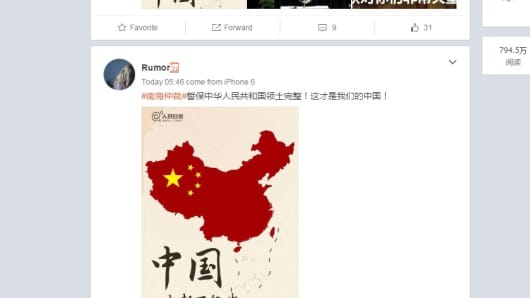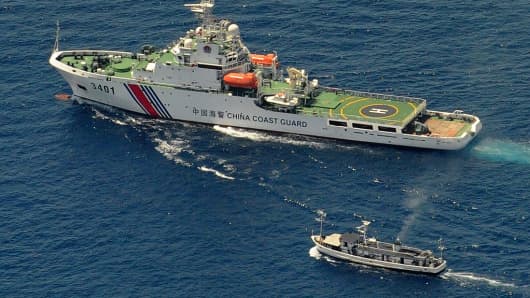Judges at an arbitration tribunal in The Hague on
Tuesday rejected China's claims to economic rights across large swathes
of the South China Sea in a ruling that will be claimed as a victory by
the Philippines.
"There was no legal basis for China to claim historic rights to resources within the sea areas falling within the 'nine-dash line'," the court said, referring to a demarcation line on a 1947 map of the sea, which is rich in energy, mineral and fishing resources.
In the 497-page ruling, judges also found that Chinese law enforcement patrols had risked colliding with Philippine fishing vessels in parts of the sea and caused irreparable damage to coral reefs with construction work.
China, which boycotted the case brought by the Philippines, has said it will not be bound by any ruling.
In reaction, China said: "The arbitration tribunal made the illegal and invalid so-called final verdict on the South China Sea dispute on July 12. Regarding this issue, China has made the statement for many times that it is against the international law that the Aquino III administration of Philippines unilaterally requested the arbitration. The arbitration tribunal has no jurisdiction on this matter."
Manila had contested China's expansive territorial claims in the South China Sea, which the Philippines contends are invalid under international law.
This is the first time a South China Sea territorial dispute has been brought to the Permanent Court of Arbitration (PCA) in The Hague and many think it will rule in favor of the Southeast Asian nation.
Control of the region is valuable because more than $5 trillion worth of global trade passes through the South China Sea each year, and China has been accused of ramping up tensions over control in recent years by building artificial islands on reefs, on which it has added airstrips and other military-style installations.
The U.S. is seeking to maintain "freedom of navigation" in the region for its ships including military vessels.
The case is under scrutiny globally as it could change the region's geopolitical landscape and set future precedence for similar challenges.
In China, the guns were out on Weibo where #SouthChinaSeaArbitration was a top trending topic on the Twitter-like social media platform on Tuesday.
Rumor (who attached this graphic with the nine dash line):
"Vow to protect the complete territorial integrity of the People's Republic of China! This is our China!"
"There was no legal basis for China to claim historic rights to resources within the sea areas falling within the 'nine-dash line'," the court said, referring to a demarcation line on a 1947 map of the sea, which is rich in energy, mineral and fishing resources.
In the 497-page ruling, judges also found that Chinese law enforcement patrols had risked colliding with Philippine fishing vessels in parts of the sea and caused irreparable damage to coral reefs with construction work.
China, which boycotted the case brought by the Philippines, has said it will not be bound by any ruling.
In reaction, China said: "The arbitration tribunal made the illegal and invalid so-called final verdict on the South China Sea dispute on July 12. Regarding this issue, China has made the statement for many times that it is against the international law that the Aquino III administration of Philippines unilaterally requested the arbitration. The arbitration tribunal has no jurisdiction on this matter."
Manila had contested China's expansive territorial claims in the South China Sea, which the Philippines contends are invalid under international law.
This is the first time a South China Sea territorial dispute has been brought to the Permanent Court of Arbitration (PCA) in The Hague and many think it will rule in favor of the Southeast Asian nation.
Control of the region is valuable because more than $5 trillion worth of global trade passes through the South China Sea each year, and China has been accused of ramping up tensions over control in recent years by building artificial islands on reefs, on which it has added airstrips and other military-style installations.
The U.S. is seeking to maintain "freedom of navigation" in the region for its ships including military vessels.
The case is under scrutiny globally as it could change the region's geopolitical landscape and set future precedence for similar challenges.
In China, the guns were out on Weibo where #SouthChinaSeaArbitration was a top trending topic on the Twitter-like social media platform on Tuesday.
Rumor (who attached this graphic with the nine dash line):
"Vow to protect the complete territorial integrity of the People's Republic of China! This is our China!"
Li Dacan:
The judgment is not important. Arbitration that is only agreed on by one party is nothing more than toilet paper. This is my land; why should I let someone else decide what belongs to me.
Genie from a different land:
Haha, America is arbitrating what belongs to China? Are you crazy? What kind of logic is this? Regulate gun control in your country before talking to me. My wish is world peace.
The Philippines made its claim under the United Nations Convention on the Law of the Sea, which both countries are signatories of.
China, however, says its historic rights predate the UNCLOS and are not at odds with its provisions.
China has been stressing its rights to the territory relentlessly in everything from official pronouncements to press editorials.
China had long said the court has no jurisdiction over the matter and will not abide the judgment.
The judgment is not important. Arbitration that is only agreed on by one party is nothing more than toilet paper. This is my land; why should I let someone else decide what belongs to me.
Genie from a different land:
Haha, America is arbitrating what belongs to China? Are you crazy? What kind of logic is this? Regulate gun control in your country before talking to me. My wish is world peace.
The Philippines made its claim under the United Nations Convention on the Law of the Sea, which both countries are signatories of.
China, however, says its historic rights predate the UNCLOS and are not at odds with its provisions.
China has been stressing its rights to the territory relentlessly in everything from official pronouncements to press editorials.
China had long said the court has no jurisdiction over the matter and will not abide the judgment.
China has said repeatedly that it prefers to negotiate directly with affected parties.
But countries may not be amenable to that idea, said Aaron Connelly, a research fellow at the Lowy Institute for International Policy.
"Over time, Southeast Asian countries have realized that China will offer these assurances and then withdraw them later," he told CNBC's "Capital Connection."
"What can be relied upon in the long term is international law. That's why the Philippines after 10 years of negotiation decided to take China to the PCA over this dispute," Connelly said.
New Philippines president Rodrigo Duterte has indicated that he wants friendly relations with China and has previously said he was open to talks with the economic giant, possibly about joint ventures in the development of the disputed region.
The legal action was initiated by his predecessor, Benigno Aquino III.
Follow CNBC International on Twitter and Facebook.
Reuters contributed to this report
But countries may not be amenable to that idea, said Aaron Connelly, a research fellow at the Lowy Institute for International Policy.
"Over time, Southeast Asian countries have realized that China will offer these assurances and then withdraw them later," he told CNBC's "Capital Connection."
"What can be relied upon in the long term is international law. That's why the Philippines after 10 years of negotiation decided to take China to the PCA over this dispute," Connelly said.
New Philippines president Rodrigo Duterte has indicated that he wants friendly relations with China and has previously said he was open to talks with the economic giant, possibly about joint ventures in the development of the disputed region.
The legal action was initiated by his predecessor, Benigno Aquino III.
Follow CNBC International on Twitter and Facebook.
Reuters contributed to this report


No comments:
Post a Comment